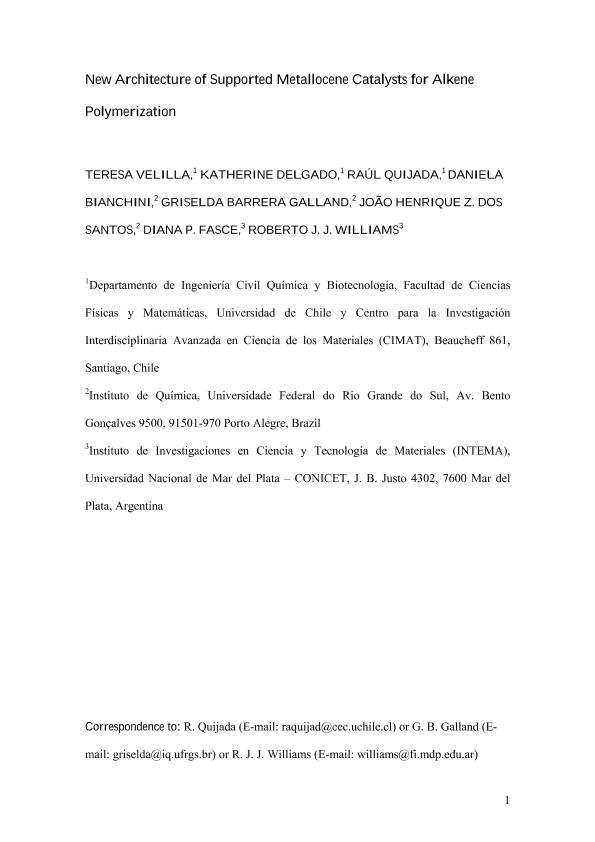Mostrar el registro sencillo del ítem
dc.contributor.author
Velilla, Teresa
dc.contributor.author
Delgado, Katherine
dc.contributor.author
Quijada, Raúl
dc.contributor.author
Bianchini, Daniela
dc.contributor.author
Barrera Galland, Griselda
dc.contributor.author
Dos Santos, João Henrique Z.
dc.contributor.author
Fasce, Diana Patricia

dc.contributor.author
Williams, Roberto Juan Jose

dc.date.available
2019-05-10T18:37:48Z
dc.date.issued
2007-12
dc.identifier.citation
Velilla, Teresa; Delgado, Katherine; Quijada, Raúl; Bianchini, Daniela; Barrera Galland, Griselda; et al.; New architecture of supported metallocene catalysts for alkene polymerization; John Wiley & Sons Inc; Journal of Polymer Science Part A: Polymer Chemistry; 45; 23; 12-2007; 5480-5486
dc.identifier.issn
0887-624X
dc.identifier.uri
http://hdl.handle.net/11336/76069
dc.description.abstract
We report the synthesis of a supported metallocene catalyst that exhibits the same activity as a homogeneous catalyst for ethylene polymerization reactions. The key to this new catalytic system is a hybrid organic-inorganic polymer obtained by the cocondensation of an organotrialkoxysilane (OTAS; 40 mol %) with tetraethoxysilane (TEOS; 60 mol %). The particular organic group of OTAS enabled us to avoid gelation when the hydrolytic condensation was performed with a thermal cycle attaining 150 °C. The resulting product [soluble functionalized silica (SFS)] was a glass at room temperature that was soluble in several organic solvents such as tetrahydrofuran and toluene. The 29Si NMR spectrum of SFS showed that the OTAS units were fully condensed (T3 species), whereas the TEOS units were mainly present as tricondensed (Q3) and tetracondensed (Q4) units. SFS was grafted onto activated silica through a reaction of silanol groups. The metallocene [(nBuCp)2ZrCl2] was covalently bonded to the SFS-modified support. The polymerization of ethylene was carried out in toluene in the presence of methylaluminoxane. The activity of the supported catalyst was similar to that of the metallocene catalyst in solution. The simplest explanation accounting for this fact is that most of the metallocene was grafted to SFS species issuing from the surface of the support through a reaction with their silanol groups. This improved the accessibility of the monomer to the reaction sites. Specific interactions of the metallocene species with neighboring organic branches of SFS might also affect the catalytic activity.
dc.format
application/pdf
dc.language.iso
eng
dc.publisher
John Wiley & Sons Inc

dc.rights
info:eu-repo/semantics/openAccess
dc.rights.uri
https://creativecommons.org/licenses/by-nc-sa/2.5/ar/
dc.subject
Catalytic Activity
dc.subject
Ethylene Polymerization
dc.subject
Metallocene Catalysts
dc.subject
Polyethylene
dc.subject
Soluble Functionalized Silica
dc.subject
Supported Metallocene Catalysts
dc.subject
Supports
dc.subject.classification
Otras Ciencias Químicas

dc.subject.classification
Ciencias Químicas

dc.subject.classification
CIENCIAS NATURALES Y EXACTAS

dc.title
New architecture of supported metallocene catalysts for alkene polymerization
dc.type
info:eu-repo/semantics/article
dc.type
info:ar-repo/semantics/artículo
dc.type
info:eu-repo/semantics/publishedVersion
dc.date.updated
2019-03-15T19:01:38Z
dc.journal.volume
45
dc.journal.number
23
dc.journal.pagination
5480-5486
dc.journal.pais
Estados Unidos

dc.description.fil
Fil: Velilla, Teresa. Universidad de Chile; Chile
dc.description.fil
Fil: Delgado, Katherine. Universidad de Chile; Chile
dc.description.fil
Fil: Quijada, Raúl. Universidad de Chile; Chile
dc.description.fil
Fil: Bianchini, Daniela. Universidade Federal do Rio Grande do Sul; Brasil
dc.description.fil
Fil: Barrera Galland, Griselda. Universidade Federal do Rio Grande do Sul; Brasil
dc.description.fil
Fil: Dos Santos, João Henrique Z.. Universidade Federal do Rio Grande do Sul; Brasil
dc.description.fil
Fil: Fasce, Diana Patricia. Consejo Nacional de Investigaciones Científicas y Técnicas. Centro Científico Tecnológico Conicet - Mar del Plata. Instituto de Investigaciones en Ciencia y Tecnología de Materiales. Universidad Nacional de Mar del Plata. Facultad de Ingeniería. Instituto de Investigaciones en Ciencia y Tecnología de Materiales; Argentina
dc.description.fil
Fil: Williams, Roberto Juan Jose. Consejo Nacional de Investigaciones Científicas y Técnicas. Centro Científico Tecnológico Conicet - Mar del Plata. Instituto de Investigaciones en Ciencia y Tecnología de Materiales. Universidad Nacional de Mar del Plata. Facultad de Ingeniería. Instituto de Investigaciones en Ciencia y Tecnología de Materiales; Argentina
dc.journal.title
Journal of Polymer Science Part A: Polymer Chemistry

dc.relation.alternativeid
info:eu-repo/semantics/altIdentifier/doi/http://dx.doi.org/10.1002/pola.22292
dc.relation.alternativeid
info:eu-repo/semantics/altIdentifier/url/https://onlinelibrary.wiley.com/doi/abs/10.1002/pola.22292
Archivos asociados
